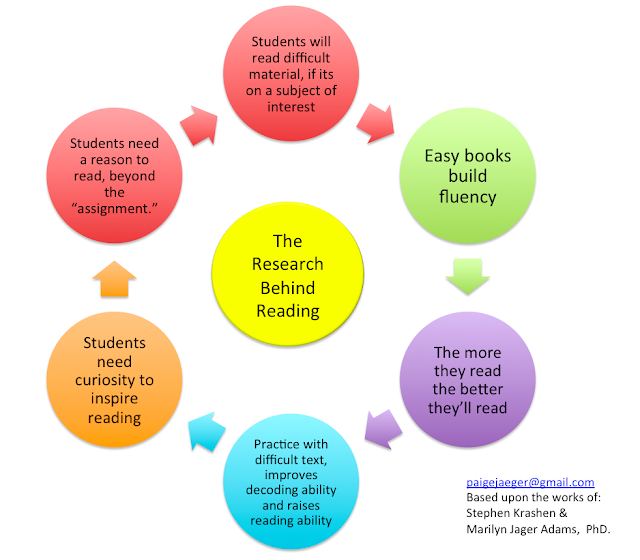Once again, yesterday, I defended a librarian espousing that their student should be able to checkout whatever they wanted to read for independent reading. Where do teachers get the idea that kids should read, an "M" or a 6.5? Have you ever heard a student say, "I really want to read a "P" book at home." No. They say, "I really want to read a muscle-car book." Or, they may say..."I really want to read that book about ..." and most of the time the librarian can read their mind and share the title.
As people wrap their heads around the Common Core and get more familiar with content and process, it's important to understand the key precepts of independent reading. We have Stephen Krashen and Marilyn Adams to thank for a great deal of the reading research which lends a playbook for your everyday librarian:
- The more students read, the better they'll read* So, why limit their reading to a pre-set reading level with limited titles available?
- Students need opportunities to read easy books to build fluency - This is ratified in Appendix A, Page 9, of the CCSS standards. We shouldn't have to define what level they should read at -- whether easy or hard -- for independent reading.
- Students need experience reading complex text to improve their ability to decode meaning when they encounter difficult material - This is based on the research of Marilyn Jager Adams, PhD. Brown University
- Students will shift from easy --> hard material if it's on a subject of their interest. - So let them choose what they want and their innate curiosity will compel them to read and achieve understanding, thus raising their reading ability.
- Students need curiosity to inspire reading. They will either have natural curiosity or stirred up curiosity (stirred up by the educator)
- Students need a reason to read that is not about 'assignment' - a quest for knowledge or an answer to find.
* [Source: - Technically, I should cite this source, as I contributed to this article for Expeditionary Learning, and used the same wording in this article which was published under their name: http://www.engageny.org/sites/default/files/resource/attachments/volumeofreading.pdf]


I teach second grade and it is so upsetting to hear a student come to me in the beginning of the year and say , "I am a J, where are the J books?" And I have heard of principals asking teachers and librarians to make a list of leveled books, so parents can choose books for their children. Yikes! I think teachers and some administrators have lost sight of the purpose of book levels and benchmarking students-it is a teaching tool and 1 small assessment piece. Readers are more than a level or number. I prefer to teach my young readers how to select books that they can read, understand and enjoy. Independent reading of books that children select themselves is key to reading success and should be the center of reading instruction. As I begin planning for my non-fiction study and thinking about my classroom library your post was very helpful.
ReplyDeleteAmen!
ReplyDeleteThe first grade teachers at my school are upset with me for allowing students to choose books from the library that are not on their reading level. And when I find out what level some of the students are on (for instructional purposes, as Debra points out), my heart sinks because no self-respecting first grader would pick books at that level. Now, while I certainly want my students to become strong readers, and I appreciate how using leveled books can assist in reading instruction, there is no way I'm going to force students to pick books that they're not instrested in, and which make them feel "like babies". What are we doing to our students? So I guess I just have to have teachers mad at me....
ReplyDeleteI remember having to check out chapter books for my first graders because they were not allowed to read them. I had one student who started the year well past J, with comprehension, but I was not allowed to test her beyond that and give her harder material, because that wasn't a first grade level! I feel satisfied that I did not listen to the rules and let her excel.
ReplyDeleteI'm not intentionally trying to be a smartie pants, but your top bubble has a grammatical error. The "its" should be "it's"! :-)
ReplyDeleteI can still remember my librarian telling me that I could not check out "B is for Betsy." I was in the first grade and it was above my reading level. What the librarian didn't know was that I had already started reading the book and wanted to take it home to finish it. I was and still am an avid reader. I was too shy to tell her that I could read it. To this day I still remember how it made me feel. :-(
ReplyDeleteI read your blog content,i like it,it was really nice nika-talana
ReplyDelete